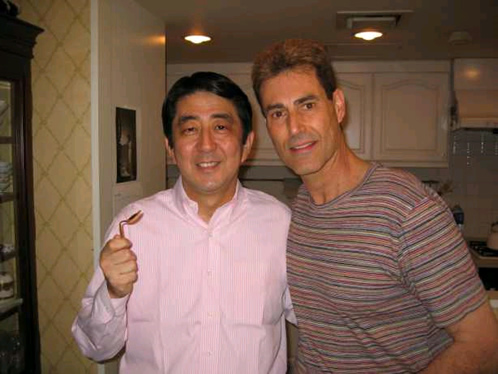Dear Mutantfrog Readers,
It is my pleasure to report that the Mutantfrog team has graciously granted me the priviledge of joining this blog. While I have regularly written at ComingAnarchy.com for more then 4 years, and will continue to do so, I have Japan-specific material that is more appropriate for MF. Accordingly, my quirky Japan material will be posted on these pages, and I will do my best to build on the existing theme, character and material of this blog. So without any further ado…
Uri Geller, the Israeli-British psychic who gained worldwide fame in the 1970s with televised claims to be able to bend spoons with the power of his mind, now wanders around the world as an independently wealthy mystic. The man has even joined the 21st century media trend and writes at his own blog. And recently, he took a trip to Japan to visit some old family friends:

I first met Shinzo Abe, a brilliant man from one of Japan’s leading families, in 1973, when he was 19 years old. His father was then leader of the Liberal party. Now Shinzo is Japan’s youngest ever Prime Minister. He is also a best-selling author, and I’m enjoying the copy of his chart-topping book Towards A Beautiful Nation… though it’s hard work for me to read Japanese.

That pretty far-out statement, both on the relationship with Abe and the ability to read Japanese. (The post came out in September 2007, the month Abe resigned). But like a lot of Geller’s blog, and his claims of psychic powers, the idea that he can muddle through reading Japanese smacks of puffery. That brief paragraph alone shows that accuracy is not his strong point — first, Abe’s Dad was in the Liberal Democratic Party, not the Liberal Party; and second, he served as the foreign minister and agricultural minister, among other posts, but never as head of the party. But the photo of Uri Geller and Abe, complete with spoon, is priceless. (And forgive me, but I can’t help but think that the horizontal and vertical creases in Abe’s shirt suggest it just came out of a box. So much for Japan’s aristocracy.) There is also a curious revelation about the research pursuits of one of Japan’s largest companies:
Japan’s foremost electronics company [Sony], which pioneered miniaturisation and invented the Walkman, had set up a psi research unit of five scientists to test the reality of extra-sensory perception. They carried out tests with psychics to find hidden objects, to see colours blindfolded and to sense which glass of water among a tray of ten had been infused with healing energy. After thousands of experiments, the psychics were scoring impossibly better than mere guesswork could ever do, with a 70 per cent success rate. And the scientists were in despair. What use was this power? They couldn’t distill it into batteries (though how they had tried!). They couldn’t use it in market research or recording studios. Sony were stumped.
Wow. I really, really hope that Sony ‘were’ just having Geller on about this, but regardless, I hope Stringer is including a review of all research departments as he cleans house and takes names over the coming weeks.
As an interesting sidenote, one of the key people who exposed Geller as a fraud was James Randi, a stage magician who made a second career of debunking the paranormal and the occult. Geller sued Randi and his affiliate organization CSICOP, with countless suits in multiple jurisdictions, with little success. However, the one jurisdiction where he successfully won a judgement against Randi was in Japan. The story of the case begins with an interview with Randi in 1989 published in Days Japan, in which Randi called Geller a “socipath,” among other derogatory statements. Geller chose to file suit — which was his typical reaction to Randi’s statements — but what made the Japan case different was that he won.
How? Japan litigation is notorious for being infamously time-consuming, with years required to reach a ruling, resulting in only paltry monetary damages. But for Geller, Japan was a key jurisdiction to file suit because it has a broader legal definition of the concept of libel and defamation. Japan has run-of-the-mill “defamation” (meiyo kison), but also the concept of “insult” (bujoku), which is both an explicit criminal violation and a civil claim that derives from a defamation claim. Geller sued on this basis, which Randi ignored (he wrote to the judge saying he couldn’t afford to hire local counsel). Instead of granting immediate summary judgment for Geller, or throwing out the case, true to stereotype the court considered the case for more than three years without resolution. Finally, the judge concluded that Randi “insulted” Geller and orderd him to pay JPY500,000 (about US$4,400) in damages. Although I can’t prove a negative, I cannot find any other suit that Geller won against Randi.
Randi refused to pay the amount, stating that the legal concept of “insult” did not exist in the United States. In a later settlement with Randi’s organization CSICOP, in which Geller paid large amounts to settle legal disputes, Geller agreed not to further pursue claims against Randi in Japan. The suit ended, but Geller still had one piece of good news — Kodansha, the publisher of Days Japan, settled with Geller and paid him the equivalent of several thousands of dollars.

Welcome to the fold…
Wow, this post brings up all sorts of questions… I wonder how many other frivolous lawsuits among foreigners are ongoing in this country? And why doesn’t this statute ever get debated? I mean, can a mere insult really be considered bad enough to be illegal? Was this just adopted wholesale from the French code or something?
For a good general account in English of the defamation law in Japan, see Mark D. West’s “Secrets, Sex, and Spectacle: The Rules of Scandal in Japan and the United States”
Geller also sued Nintendo.
And the makers of Pokemon, for the “Un-Geller” character/card.
“And forgive me, but I can’t help but think that the horizontal and vertical creases in Abe’s shirt suggest it just came out of a box. So much for Japan’s aristocracy.”
I loved this comment.
I think that is just what happens when politicians try and dress themselves.
“Hmm, I need a shirt after two hours in the sauna with Gellar… Ah, this one’s brand new, perfect!” And then fashion tragedy ensues.
The horizontal & vertical creases…? Shirt just came out of a box?! No, that’s simply how shirts fresh back from the cleaners look, at least in Japan.
Todd, if that’s the case, you and Mr. Shinzo need to go to a new cleaners. All of my shirts come back from the cleaners on plastic hangers. And just in case you think I’m going to some hoity-toity cleaners, believe me, I’m not — you can turn in the hangers for 20 yen a pop and we do so religiously.
Does no one find it disturbing that Sony had a team looking into psycic powers??
I knew you were going to ask that.
Shinzo Abe wearing a shirt fresh from the box is way more disturing, seriously. He’s certainly nowhere near Aso’s award-winning level of suaveness, but this is the shirt equivalent of walking into the office with a stained tie.
Anyway, as far as the Economist is concerned, Sony has tried almost everything:
http://www.economist.com/displayStory.cfm?story_id=13061521
From that Economist piece:
“Companies tend to focus on the things that can drop on your foot and neglect lucrative revenues from services. ”
Things that can drop on your foot? WTF.
“Does no one find it disturbing that Sony had a team looking into psycic powers??”
I’d have found it more disturbing if they claimed to have found any. But it does sound extreme. Then again the US Govt has done the same thing.
My drycleaned shirts get folded too. But those creases do look new. Maybe Uri Geller can crease shirts with his mind as well as bend spoons.
Incidentally, this is a truly epic fail – worth watching to see Uri at the height of his powers….
http://www.youtube.com/watch?v=TNKmhv9uoiQ
It was “real”, check this out –
ソニー 「未知情報」への挑戦―科学のニューフロンティアを求めて (単行本)
佐古 曜一郎 (著)
My feeling, however, is that it was all just a BS PR thing.
This is better.”カルト資本主義”斎藤貴男
http://www.amazon.co.jp/カルト資本主義-文春文庫-斎藤-貴男/dp/4167443023
BTW Curzon, great to have you on the team, and an excellent first post to set the tone.
Now we have to find a more direct link between Uri Geller and APA group.